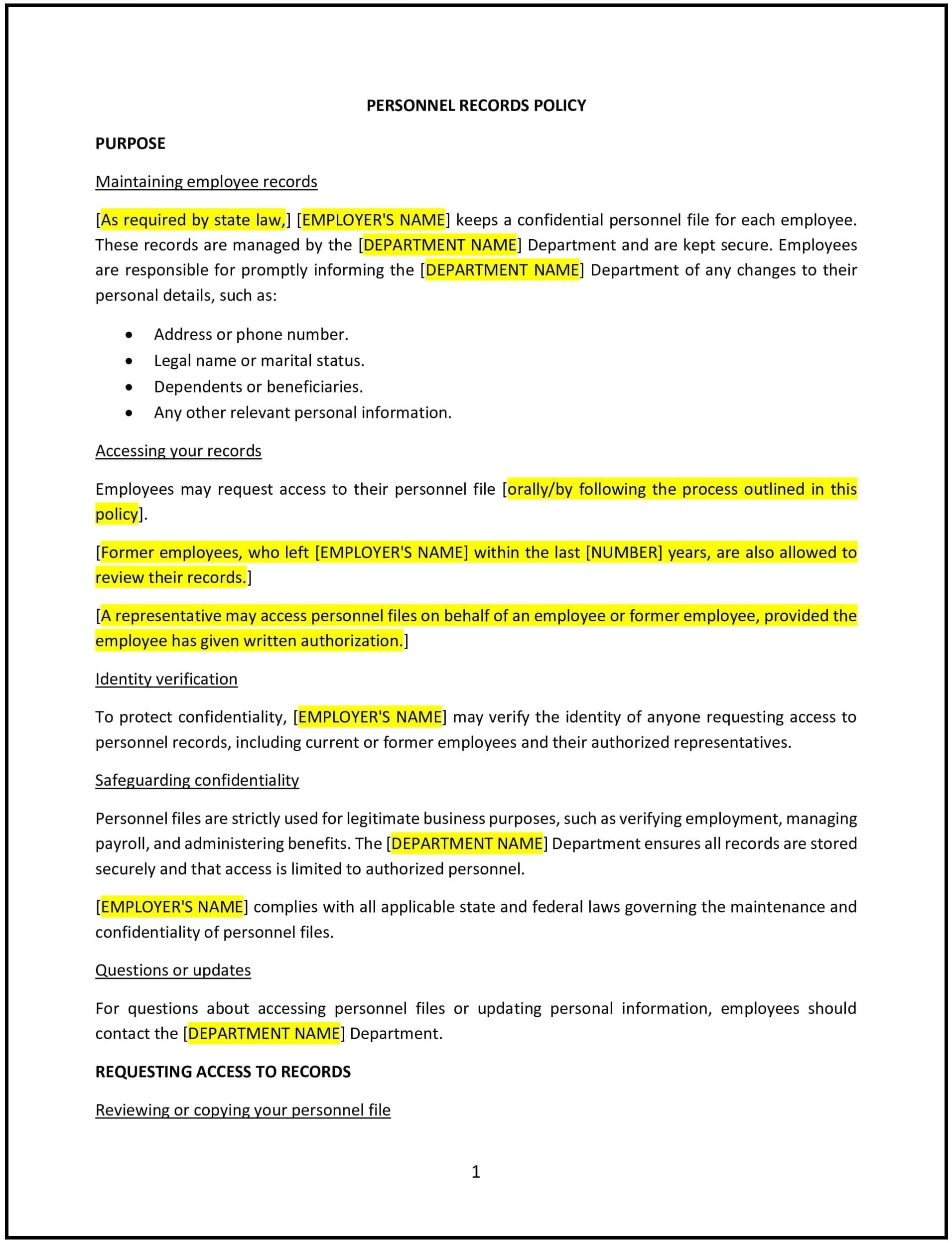Personnel records policy (Massachusetts): Free template
Got contracts to review? While you're here for policies, let Cobrief make contract review effortless—start your free review now.

Customize this template for free
This personnel records policy is designed to help Massachusetts businesses manage and maintain accurate, confidential, and legally compliant records for their employees. The policy outlines the types of personnel records the company will retain, how those records will be stored, and who will have access to them. It promotes compliance with Massachusetts state laws, federal regulations, and best practices regarding the protection of personal data and the maintenance of employee records.
By adopting this policy, businesses can protect sensitive employee information, comply with legal requirements, and maintain transparency in how employee data is handled.
How to use this personnel records policy (Massachusetts)
- Define types of personnel records: Specify the types of records that will be maintained for each employee. This can include personal details (e.g., name, address, contact information), employment history, performance evaluations, disciplinary records, payroll and compensation data, benefits records, and any other information relevant to the employee’s employment.
- Establish procedures for record maintenance: Outline the procedures for maintaining employee records, including how they will be updated, stored, and protected. This should include provisions for the secure storage of both physical and electronic records, such as using password-protected systems or encrypted storage for digital files.
- Address access to records: Specify who will have access to personnel records, and under what circumstances. Typically, access is restricted to HR personnel, managers, and others with a legitimate need to know. The policy should also specify how employees can request access to their own records and the process for granting that access.
- Ensure confidentiality and security: The policy should establish strict guidelines for maintaining the confidentiality of employee records. This includes controlling access to records, preventing unauthorized disclosures, and implementing physical and digital security measures to protect sensitive data.
- Retention and disposal of records: Define how long personnel records will be retained and the process for safely disposing of outdated records. The policy should outline how long records will be kept based on legal requirements and business needs. After this period, records should be securely destroyed to protect employee privacy.
- Address employee rights regarding records: Employees should be informed about their rights to view, update, or correct their records. The policy should specify how employees can request access to their records, request changes, or dispute inaccuracies.
- Ensure compliance with Massachusetts and federal laws: Ensure that the policy complies with Massachusetts state laws, including the Massachusetts Data Privacy Law, as well as federal regulations such as the Fair Labor Standards Act (FLSA) and the Equal Employment Opportunity Commission (EEOC) guidelines.
- Review and update regularly: Periodically review and update the policy to ensure it is compliant with changes in Massachusetts state laws, federal regulations, and the company’s evolving record-keeping practices.
Benefits of using this personnel records policy (Massachusetts)
This policy offers several benefits for Massachusetts businesses:
- Promotes legal compliance: The policy helps businesses comply with Massachusetts state laws, federal regulations, and industry standards regarding employee records, reducing the risk of legal issues related to record-keeping practices.
- Protects employee privacy: By implementing strict confidentiality and security measures, businesses can protect sensitive employee data and foster trust with employees, ensuring their personal information is handled responsibly.
- Promotes transparency and fairness: The policy ensures that employees are informed about how their records are maintained, who has access to them, and how they can request changes. This promotes transparency and helps employees feel more secure in their relationship with the company.
- Reduces the risk of data breaches: By outlining proper procedures for storing and accessing personnel records, businesses can minimize the risk of data breaches or unauthorized access to confidential employee information.
- Enhances organizational efficiency: A well-organized record-keeping system helps businesses manage employee data more effectively, improving administrative efficiency and ensuring that necessary information is readily accessible when needed.
- Improves risk management: The policy helps businesses manage risks related to employee records by promoting compliance with applicable laws and establishing guidelines for proper data retention and disposal.
Tips for using this personnel records policy (Massachusetts)
- Communicate the policy clearly: Ensure that all employees understand the personnel records policy and how their personal information will be handled. Include the policy in the employee handbook and provide training during onboarding.
- Regularly audit record-keeping practices: Periodically audit the company’s record-keeping practices to ensure compliance with the policy and relevant laws. This helps identify areas where procedures can be improved or where additional security measures may be needed.
- Implement secure storage systems: Use secure methods for storing both physical and electronic personnel records. For digital records, consider using encrypted storage systems and limit access to authorized personnel only.
- Provide access to employees: Allow employees to access their own personnel records upon request. Make it easy for employees to update or correct any inaccuracies in their records, and ensure there is a clear process for doing so.
- Handle sensitive records with care: Personnel records may contain sensitive information, such as medical records or performance reviews. Ensure that these records are stored and handled with extra care to protect employee privacy.
- Review and update regularly: Periodically review the policy to ensure it is compliant with Massachusetts state laws, federal regulations, and the company’s evolving record-keeping needs. Make updates as necessary to address changes in laws or business practices.